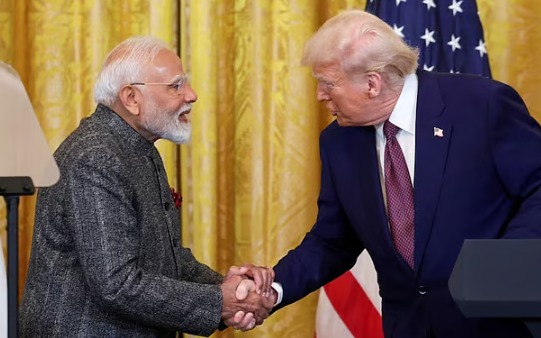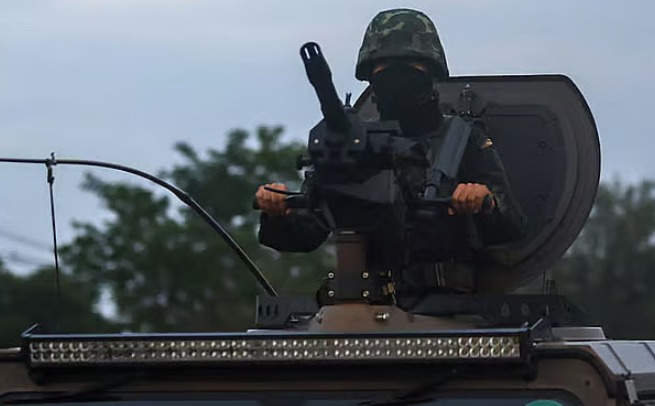Desk Report,
Why is India suddenly looking to strengthen ties with China, leaving the US behind?
US President Donald Trump’s lunch meeting with Pakistan’s army chief Asim Munir has sparked fresh tensions in India. New Delhi has lodged a secret diplomatic protest over the issue. The country is also taking steps to reassess relations with China as an alternative strategy.
Why is India suddenly looking to strengthen ties with China, leaving the US behind?
The United States and India have long had good relations. The Trump administration is considering imposing tariffs on the country, one of its key partners in the Indo-Pacific region. In such a situation, Trump’s meeting with Asim Munir and other tensions have put pressure on bilateral trade talks.
India has accused Pakistan, especially its military, of supporting cross-border terrorist activities. Three senior government officials in the country told Reuters that India has told the United States that by drawing Field Marshal Asim Munir closer, it is sending the wrong message.
The officials said Trump’s meeting with the Pakistani army chief is creating an uncomfortable situation that will harm bilateral relations in the future.
However, Pakistan denies the accusation that it is supporting terrorists who attack Indian targets. The country said New Delhi has yet to provide any evidence that Pakistan is involved. Despite minor setbacks over the past two decades, US-India relations have strengthened. At least one reason for this is the anti-China stance of the two countries.
Michael Kugelman, a senior fellow at the Asia Pacific Foundation, a Washington-based think tank, said the current problems are a little different. The way the US is engaging with Pakistan frequently and deeply and ignoring India’s concerns, especially after the recent conflict with Pakistan, is creating some discontent in the bilateral relationship.
Michael Kugelman said, “What is worrying this time is Trump’s unexpected behavior. The tension has been further exacerbated by Trump’s new proposals for counter-tariffs.” Prime Minister Narendra Modi’s office and India’s foreign ministry did not respond to requests for comment. However, the state ministry had previously said it had “taken note” of Trump and Asim Munir’s meeting.
A US official said they do not comment on personal diplomatic contacts or discussions. The United States maintains strong ties with both India and Pakistan.
“These relationships stand on their own merits,” the US official said. “We don’t compare our relationship with one country to another.”
White House Lunch
The United States is seen taking a different tack toward Pakistan after the nuclear-armed countries briefly went to war in May. India claimed it had carried out the strikes on militant bases across the border in retaliation for a deadly attack on Hindu tourists in Kashmir.
India and Pakistan agreed to a ceasefire after four days of airstrikes, missile strikes and drone strikes.
Hindu-majority India and Muslim-majority Pakistan have fought three major wars since independence in 1947. Two of them were over the disputed territory of Kashmir. In addition, there have been minor border clashes between the two countries. A few weeks after the May clash, President Donald Trump invited Pakistan’s army chief Asim Munir to the White House for lunch. This was a major development in US relations with Pakistan. Because the relationship was largely dormant during Trump’s previous term and the Biden administration.
This is the first time a US president has invited the Pakistani army chief to the White House. And that too without any senior Pakistani civilian officials with him. In Pakistan, of course, the army chief is considered the most powerful person.
Indian leaders claim that Munir’s view of India and Pakistan is entirely based on religion. Indian Foreign Minister S Jaishankar said in May about the Kashmir attack, “Tourists were killed in front of their families knowing their religion.”
Jaishankar claimed that to understand this, one has to see that the Pakistani leadership, especially their army chief, is an extremely religious person.
On the other hand, Pakistan is alleging that it is not Asim Munir, but Indian Prime Minister Narendra Modi who is being guided by religious extremist ideology. And his Hindutva politics are trampling on the rights of India’s Muslim minority.
However, Narendra Modi and the Indian government have repeatedly claimed that they do not discriminate against any minority.




